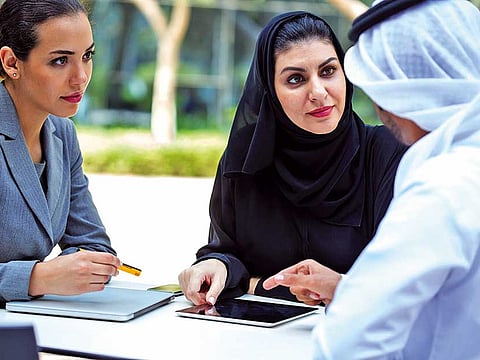Economic empowerment for women focus of Weegs 2019
When half of humanity is left behind, the entire world is placed at an disadvantage

Sharjah: Inclusive and equitable economic growth can only be possible with women’s economic empowerment, Sheikha Jawaher bint Mohammed Al Qasimi, wife of His Highness Dr Sultan Bin Mohammad Al Qasimi, Supreme Council member and Ruler of Sharjah and Chairperson of NAMA Women Advancement Establishment, stated ahead of the upcoming Women’s Economic Empowerment Global Summit (WEEGS 2019) in Sharjah.
Ensuring women’s full participation in the economy is vital to boosting economic growth and achieving the wider sustainable development goals (SDGs) outlined in the UN 2030 Agenda, Sheikha Jawaher said, strongly calling upon organisations and individuals to actively engage in the second edition of WEEGS, to be held on December 10—11, at the Al Jawaher Reception and Convention Centre (JRCC) in Sharjah.
“Women’s realities are constantly changing,” said Sheikha Jawaher, adding that “Integrating women in the economic domain and investing in their development will create a ripple effect that will benefit not just individual women but families, communities and nations around the world.”
“Women are resourceful economic agents and eliminating all forms of discrimination against women is not merely a national or moral duty; it is a fundamental human right enshrined in the values of the United Nations,” she said.
Fulfilment of Agenda 2030 means leaving no one behind
“The fight for gender equity is a shared, global concern,” said Sheikha Jawaher. “A key challenge to women’s economic empowerment is biased provisions often embedded in legal frameworks and policies. By advancing the public debate on gender equity, events like WEEGS can help create an enabling environment and catalyse governments, communities and legal institutions into action to frame egalitarian provisions to ensure women’s participation in the real economy.”
However, to bridge gender gaps in legislation and on the ground, the onus is on communities to consciously attempt to let go of discriminatory attitudes and mindsets, and to usher in a society that guarantees the social and economic empowerment of women, Sheikha Jawaher added.
Integrated and multidimensional approaches in women’s advancement are vital to providing solutions to some of the unique challenges constraining women’s empowerment globally. “Social and economic empowerment aspects should be demarcated for women not only keeping in mind that they are — and must be — part of the labour market, but also valuable members of community with rights and duties on par with men,” pointed out Sheikha Jawaher. “Increasing sustainable livelihoods of women is also a tool to advance social development, as it leads to reduction in poverty, better health conditions, higher education rates, and builds more inclusive societies by promoting social harmony.”
“Agenda 2030 promises to ‘leave no one behind’; but when one half of the human race is denied the opportunity to realise their full potential, it is the entire world that is placed at an economic disadvantage,” she added.
WEEGS 2019 is organised by NAMA Women Advancement Establishment in line with its commitment to promoting women’s status economically and professionally, and is held in collaboration with UN Women, a global champion for women and girls.
Sign up for the Daily Briefing
Get the latest news and updates straight to your inbox



